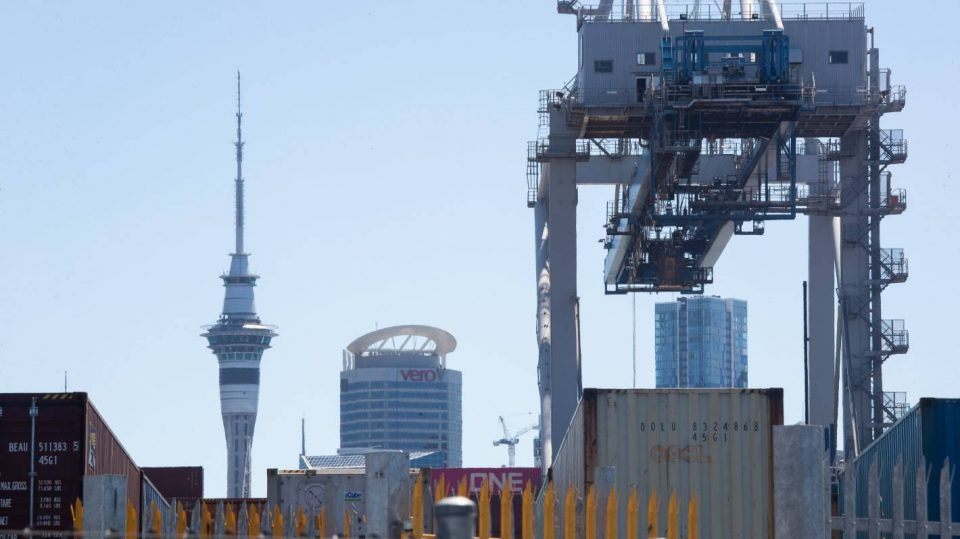- Productivity at ports has gone backwards during the pandemic with ships and containers being processed at a slower rate
- When it comes to supply chain issues, Cosco Shipping Lines’ NZ general manager argues there are more important questions to resolve than whether the port in central Auckland should be moved to the Manukau Harbour
- Moving to a 24-7 supply chain is seen as a way to ease the bottlenecks, but the availability of labour is a key constraint
The New Zealand general manager of Cosco shipping lines says we shouldn’t get distracted from major supply chain issues with a big debate about moving Auckland’s port.
Supply chain issues like shipping delays, and the increased cost of transporting goods across borders, have been blamed for skyrocketing inflation.
Cosco Shipping Lines NZ general manager Mark Scott said New Zealand ports processed 7% fewer containers between January and June of this year than they did during the same period in 2019.
Scott cited other statistics showing port productivity in New Zealand had gone backwards since the pandemic: the ship processing rate had declined by a third since 2019, and the number of crane moves per hour had gone from 31 in 2019 to 28 in 2021.
READ MORE:
* When will supply chain woes end?
* Yes, the supply chain grinch will probably steal Christmas again
* Pressure ramps up for NZ to charter its own ships
* Empty shipping containers pile up despite global shortage and ‘ghost ship’ runs
Shipping capacity had also effectively been cut because ships were taking longer to make their way around different ports and were also spending more days at sea.
On Monday, the first day of the two-day Freight Futures summit in Auckland, representatives of ports, transport, freight and energy companies, highlighted these and other supply chain issues.
Faced with a question about how realistic it was to move Auckland’s port to the Manukau Harbour – something which the Government is conducting a feasibility study on – Scott said the issue was a distraction from more pressing ones.
Chris McKeen/Stuff
Port productivity in New Zealand has declined since the start of the pandemic.
Shanghai-based Cosco is one of the world’s largest shipping lines and its port-owning subsidiary Cosco Shipping Ports is one of the world’s largest port operators, too.
“We have been too distracted by the new port, which is important, but we’ve got a lot to do,” Scott said.
One of those pressing issues is the possibility of more supply chain disruptions in the years to come.
At the same conference, University of Auckland Centre for Supply Chain Management director Tava Olsen made a “plea” for the Government to urgently undertake work to see how the country might be able to survive a major disruption to the flow of goods across borders – or the disaster scenario of a full border closure.
“The pandemic was a wakeup in terms of we hadn’t done a lot of that planning – and our borders weren’t even closed, they were just sluggish.”
New Zealand Trade and Enterprise supply chain adviser Dave Christie cited a McKinsey study which said companies could now expect month-long disruptions to supply chains once every four years.
Scott saw a move to a 24-7 supply chain as something that could smooth out disruptions, but others highlighted a lack of skilled labour as the main barrier to this.
Swire Shipping country manager Brodie Stevens said immigration, and the flow-on effects of not having enough skilled workers to do the work, was the “elephant in the room” when it came to ongoing freight delays.
Dileepa Fonseka/Stuff
A Freight Futures summit in Auckland has highlighted a range of issues including labour supply as responsible for supply disruptions at ports.
Customs Brokers and Freight Forwarders Federation President Rachel Madden said working weekends, or late-night shifts during winter, just wasn’t appealing to enough workers.
Auckland Port chief executive Roger Gray highlighted local government issues as another major constraint. Councils were increasingly demanding higher returns from their port assets, something which might add extra costs into the supply chain in future, while activism over “harbour health” could constrain future port growth if ports weren’t proactive about consulting mana whenua and others.
Slotting in over the top of all of this was the issue of climate change, which several speakers argued had implications for the future of shipping too, especially when it came to the action that might need to be taken to reduce emissions.
Slowing down ships, for example, would reduce emissions, but would also lead to delays.
Stevens said, in the end, the solution might well be to pass on higher prices.
“That’s the thing about sustainability at the moment, if you really want it then somebody’s going to have to pay for it.”


